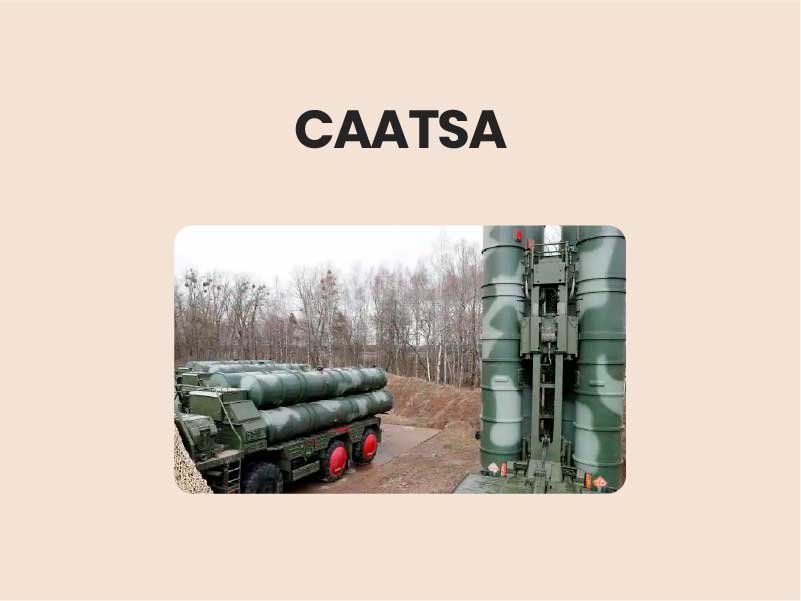
Countering America’s Adversaries Through Sanctions Act (CAATSA)
CAATSA is a United States federal law that imposed sanctions on Iran, North Korea, and Russia. It includes sanctions against countries that engage in significant transactions with Russia’s defense and intelligence sectors.
Imposed sanctions:
- prohibition on loans to the sanctioned person.
- prohibition of Export-Import bank assistance for exports to sanctioned persons.
- prohibition on procurement by United States Government to procure goods or services from the sanctioned person.
- denial of visas to persons closely associated with the sanctioned person.
US’s CAATSA law:
- The Countering America’s Adversaries through Sanctions Act (CAATSA), aims at taking punitive measures against Russia, Iran, and North Korea.
- The Act primarily deals with sanctions on the Russian oil and gas industry, defence and security sector, and financial institutions, in the backdrop of its military intervention in Ukraine and its alleged meddling in the 2016 US presidential elections.
- The Act empowers the US President to impose at least five of 12 listed sanctions enumerated in Section 235 on persons engaged in a “significant transaction” with the Russian defence and intelligence sectors.
- The State Department has notified 39 Russian entities including almost all major Russian defence manufacturing and export companies/entities
CAATSA Sanctions and India:
- There had been much speculation in India about its potential impact on India-Russia defence relations especially in the context of India’s possible purchase of the S-400 missile system.
- That was because CAATSA was enacted to punish Russia by sanctioning persons engaging in business transactions with the Russian defence sector.
- It was felt that CAATSA sanctions would make difficult payments in US Dollars to Rosoboronexport for the S-400 purchase.
- Although CAATSA, meant to discourage exports of Russian defence equipment, was enacted more than a year ago, there were no CAATSA related sanctions until last week even though Rosoboronexport, the export arm of the Russian defence industry, had already concluded contracts worth more than USD eight billion this year.
- The US imposed CAATSA sanctions on a Chinese entity, the Equipment Development Department (EDD) of China’s Central Military Commission (CMC), and on its Director. The sanctions were in response to China’s purchase of Su-35 aircraft and the S-400 system.
- CAATSA had not specified any specific sanctions, only that five or more sanctions from a list of 12 had to be imposed on the person whom “the President determines, knowingly engaged in a significant transaction” with a person who is a part of Russia’s defence sector, in this case Rosoboronexport.
- 11 of the 12 prescribed sanctions will have little or no effect on India’s current dealings with Rosoboronexport, and hence on India-Russia defence relations.
- However, the twelfth sanction has the potential to completely derail the India-US Defence and Strategic Partnership unless the sanction were to be waived.
Reasons behind this exemption:
- CAATSA impacts Indo-US ties, and dents the image of the US as a reliable partner at a time when it is projecting India as a key player in its Indo-Pacific strategy.
- US administration for countries like India has favoured relief, citing the “strategic opportunity” that India presents, and also the opportunity “to trade in arms with India”.
- Indeed, the US defence industry sees India as a major market, Over the last decade, deals with India have grown from near zero to $15 billion.
- Both in term of the number and value of contracts, the US is way ahead of other major suppliers.
- The CAATSA exemption also underlines the growing defence and security cooperation that has seen India sign a logistics pact with the US.
- Also US designated India as a Major Defence Partner, and both countries coming together on Indo-Pacific strategy, the newly resurrected Quad.
- It also marks an acceptance by the US of the point of principle that as a sovereign country, India cannot be dictated on its strategic interests by a third country.
India needs to balance its relation with both Russia and USA, so that its national interest is not compromised.
Enroll today with the best civils service academy and take your first step towards your Civils journey. Feel free to reach out to us for any inquiries, collaborations, or support. We’re here to help.

